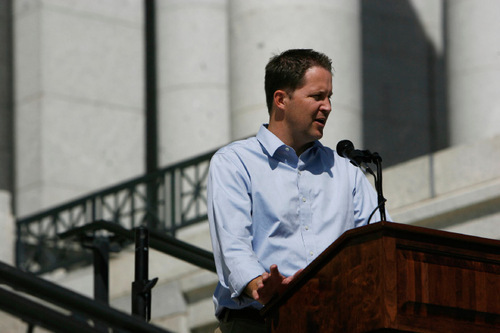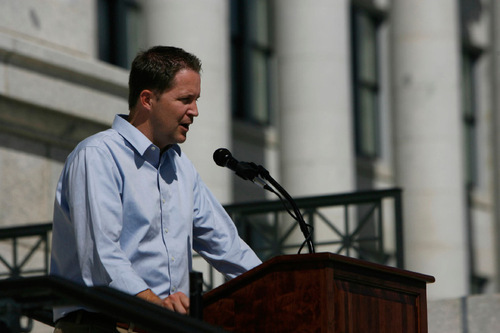This is an archived article that was published on sltrib.com in 2010, and information in the article may be outdated. It is provided only for personal research purposes and may not be reprinted.
It was Morgan Philpot's insights into a Democratic White House that he says got him active in Republican politics.
Bill Clinton was president and Philpot, then a University of Utah anthropology and environmental studies student, was a Hinckley Institute intern to the White House Council on Environmental Quality. He said he viewed documents showing the administration's plan to designate the Grand Staircase-Escalante National Monument, and knew officials were keeping secrets from Utahns who recoiled at the idea.
It felt wrong to him.
"My whole D.C. experience was disenchanting," he said.
Philpot returned to Utah and got involved locally, first as a state GOP delegate from the Midvale area and then, from 2000 to 2004, as a legislator for House District 45. He resigned that office to get a law degree at a small Michigan school, Ave Maria College, and has since lived in American Fork working as general counsel for Reagan Outdoor Advertising and, recently, as a legal and government affairs consultant.
Now 39, he returned to politics this year to challenge Rep. Jim Matheson because, he said, Washington's recent Democratic surge and resulting change in land management were too familiar.
"It was almost a repeat of how I felt when I came back from D.C.," he said. "It's time to recycle Congress."
Public land policy has been at the core of Philpot's campaign. He praised Sen. Orrin Hatch, R-Utah, for attempting to challenge the president's authority under the Antiquities Act to preserve lands as national monuments, and said he would join that effort if elected. He also wants legislation forbidding the U.S. Bureau of Land Management and other agencies from making unilateral decisions on oil and gas drilling, public access or other uses. Local officials should have a formal role in those decisions, he said.
Philpot said he likes the idea of signing over federal lands to states, but only gradually. In the meantime, he said, local control is the goal.
"We're being forced to sit down to the table with a gun to our head," he said, "where if we don't do what they want, we will lose more and more control as a state."
He accused Matheson of talking about local values but doing nothing to protect Utah's influence on public lands. Matheson has helped broker a wilderness compromise in Washington County and is working on a bill to further protect Wasatch Front watershed wilderness, both efforts with mixed support among local officials. Philpot said he's done little to control what he considers a hostile White House attitude toward public lands development.
In fact, inaction is a theme in Philpot's campaign attacks. A TV ad now running shows an empty armchair representing Matheson's House seat and says he has passed only two bills in nearly a decade in office.
Matheson calls that a lie and says it breaks a trust with Utah voters. His office sent reporters a list of legislation — eight bills passed through Congress and five through the House awaiting Senate action.
"Voters want public trust," Matheson said. "Agree or disagree, [but] be straightforward."
Philpot said his ads are accurate, because most of Matheson's legislation got blended into larger bills that no longer bore his name as a primary sponsor. Attaching measures to omnibus bills is sneaky anyway, he said.
"That's how they get their pork through," he said.
Philpot's campaign has been overshadowed at times by other races, including the battle over Bob Bennett's Senate seat, which drew big voter enthusiasm and national media attention when Mike Lee ousted Bennett. Philpot spoke Thursday at a state Capitol Constitution Day observance organized by the Utah Legislature's conservative Patrick Henry Caucus, where only a dozen supporters gathered.
Those who listened were passionate in their support. Victor Shanti, of Salt Lake City, said Matheson appears to orchestrate the public questions at his public appearances, whereas Philpot will talk to voters. He also agreed with Philpot on his signature issue.
"Utah should get more control over the lands within our boundaries," Shanti said.
Utah Republican Party Chairman Dave Hansen said Matheson has played his incumbency well in previous elections, and Philpot was the only one who stepped up to face him this year.
"You could go around and say another candidate may be better," he said, "but you have to have the desire to do it, and Morgan Philpot had the desire and was willing to put his name out on the line and make sacrifices." —
And in this corner
Morgan Philpot is the Republican nominee in Utah's 2nd Congressional District
• 39 years old
• former state lawmaker
• legal counsel and government affairs consultant for Reagan Outdoor Advertising
• resident of American Fork





